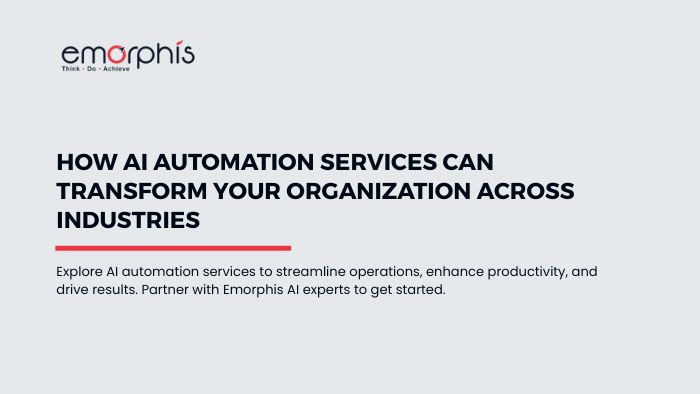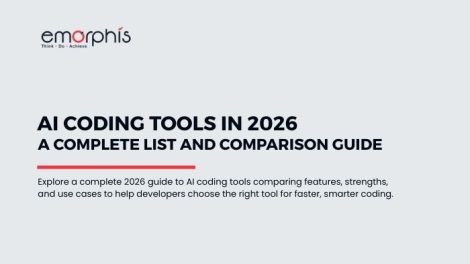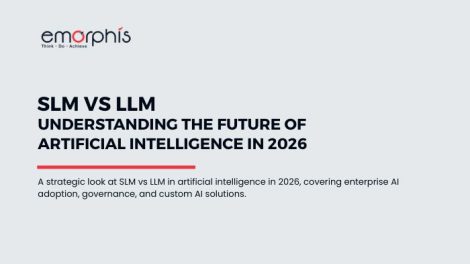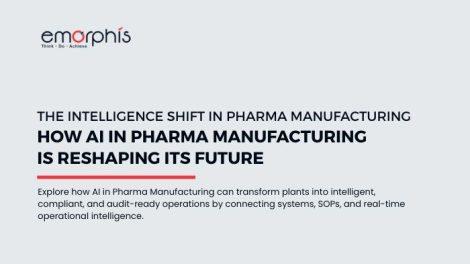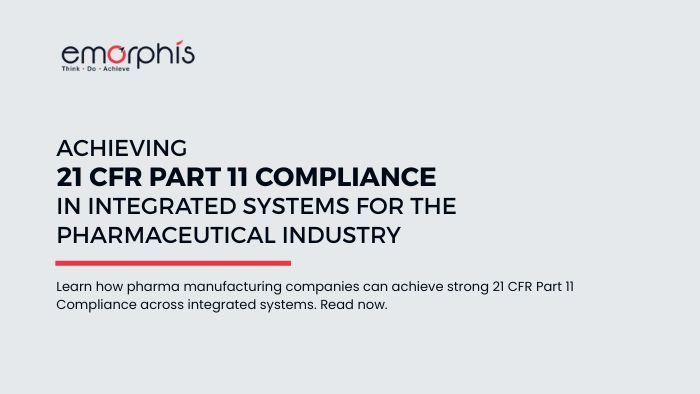Introduction
Every organization today is looking for ways to improve efficiency, reduce operational delays, and make faster decisions. The rapid shift toward intelligent systems has created an environment where companies must either evolve or fall behind. This is where AI automation services create the biggest impact. By combining data, algorithms, and real-time decision intelligence, AI-driven automation is now influencing how businesses operate, deliver value, and scale.
The rise of enterprise AI has not been limited to a single sector. From healthcare and banking to retail and logistics, organizations are adopting AI automation services to optimize workflows and unlock new levels of performance. Leaders are evaluating how AI can help them streamline internal processes, elevate customer experiences, and create sustainable competitive advantages.
The market demand for automation has also resulted in a strong shift toward action-oriented adoption. More companies are ready to hire an AI automation partner, buy enterprise AI solutions, or subscribe to AI powered automation platforms that help them modernize their systems. As industries move toward autonomous operations, the question is no longer whether you should use AI. The question is how quickly you can integrate it to strengthen your business and outperform your competitors.
This article explores how AI automation services can transform organizations across every major industry and highlights the key areas where enterprises can begin their adoption journey.
What Are AI Automation Services
AI automation services refer to the set of intelligent solutions that automate tasks, workflows, decision making, and complex operations using artificial intelligence and machine learning. These tools go beyond simple rule based automation and bring real-time learning capabilities, predictive insights, and adaptive decision engines into the enterprise ecosystem.
While traditional automation focuses on repetitive actions, AI automation services understand patterns, analyze data, and take context-aware actions. This makes them ideal for organizations that want to reduce manual workload, minimize operational errors, and accelerate execution speed. Through capabilities such as natural language processing, predictive analytics, computer vision, and autonomous process management, these services enable businesses to operate with greater accuracy and resilience.
Organizations often consider hiring an AI automation company or buying AI solutions when they need scalable automation across multiple functions like customer operations, finance workflows, compliance, supply chain, or IT processes. Many enterprises also choose to subscribe to AI platforms that deliver automation as a service, giving them flexibility and faster time to value.
In simple terms, AI automation services give your organization the ability to work smarter, not harder. They help you make informed decisions, optimize employee productivity, ensure process consistency, and strengthen your overall operational performance. Over time, companies that adopt AI driven automation not only reduce costs but also position themselves for long-term growth and industry leadership.
As organizations deepen their understanding of what AI automation services truly offer, the next step is recognizing why these capabilities have become essential in the modern business landscape. This brings us to the core question of why companies across every industry are rapidly moving toward AI driven automation today.
Why Organizations Need AI Automation Services Today
A. Rising Operational Complexity
Organizations are navigating increasing process complexity, larger data volumes, and growing customer demands. AI automation services help manage this scale with precision and speed.
B. Limitations of Manual and Traditional Systems
Manual workflows cannot process millions of data points or deliver real-time decisions. AI systems bring accuracy, consistency, and adaptive intelligence into daily operations.
C. Workforce Augmentation and Productivity
AI automation services handle repetitive tasks such as data entry, reporting, ticket routing, claims checks, and quality inspection. This frees employees to focus on strategic, creative, and customer-centric work.
D. Long-Term Cost Optimization
By reducing errors, minimizing downtime, and improving process throughput, organizations experience measurable cost savings. AI automation creates compounding operational benefits over time.
E. Strategic Adoption for Competitive Advantage
Many companies are now ready to hire an AI automation partner, buy enterprise AI solutions, or integrate AI platforms to gain long-term competitiveness. Early adopters gain a sustained advantage over those who delay.
Learn how AI drives down software development cost.
With a clear understanding of why AI automation services are now critical for organizational growth, the next step is learning how companies can begin their adoption journey. Implementing AI requires a structured approach, and choosing the right pathway determines how quickly an organization can unlock measurable value.

How to Adopt AI Automation in Your Organization
1. Identify High-Impact Use Cases
Start by assessing processes that suffer from high manual effort, slow turnaround time, high error rates, or poor visibility. These areas deliver the fastest ROI with AI automation services.
2. Choose the Right Adoption Path
Organizations can adopt AI automation in multiple ways depending on their maturity, budget, and internal capabilities.
2.1 Hire an AI Automation Company
Ideal for businesses that need customized automation, industry-specific workflows, or deep integration with existing systems.
2.2 Buy Enterprise AI Automation Solutions
Best suited for companies that want ready-to-deploy automation with proven models for operations, customer service, analytics, and compliance.
2.3 Subscribe to AI Powered Automation Platforms
A flexible option where organizations subscribe to a scalable platform and pay only for consumption. This reduces upfront investment and speeds up implementation.
3. Integrate AI with Existing Systems
AI automation must align with current tools such as ERP, CRM, EHR, finance systems, and supply chain applications to deliver end-to-end automation.
4. Ensure Data Readiness and Compliance
Successful AI automation requires clean historical data, defined governance standards, and compliance with industry regulations.
5. Measure Value and Scale Further
Organizations should evaluate productivity improvements, cost reductions, quality enhancements, and customer experience outcomes, then scale AI into additional departments.
Discover details on AI-assisted software development.
Once an organization understands how to adopt AI and what the implementation journey looks like, the next step is identifying where AI automation services can create the highest impact. While the benefits are universal, the applications differ across industries. Exploring these industry wise use cases helps businesses see how AI can solve their specific operational challenges and unlock new growth opportunities.
AI Automation Services Across All Major Industries
AI automation services are now being adopted across almost every major industry, transforming operations, enhancing decision-making, and enabling scalable growth. The following sections highlight how AI delivers value in different sectors.
1. Healthcare
1.1 Clinical and Administrative Automation
AI automation services can handle patient registration, appointment scheduling, medical record management, and discharge processes with minimal manual intervention. Hospitals can also automate pre-authorization, insurance verification, and lab report processing, reducing administrative costs significantly.
1.2 Patient Engagement and Virtual Assistance
AI-powered chatbots and virtual health assistants guide patients through symptom assessment, medication reminders, and post-treatment follow-ups. This improves accessibility for patients and allows healthcare providers to maintain continuous engagement.
1.3 Claims and Billing Automation
AI systems automatically code procedures, check compliance with insurance policies, and flag anomalies in claims. This reduces claim rejections, accelerates reimbursement cycles, and ensures operational compliance.
1.4 Regulatory and Compliance Automation
With healthcare regulations like HIPAA and 21 CFR Part 11, AI automation services maintain audit-ready records, ensure secure data handling, and automate compliance reporting.
Find details on Healthcare app development services.
2. Finance and Banking
2.1 Fraud Detection and Risk Assessment
AI models continuously monitor transactions to detect unusual patterns and prevent financial fraud. These systems provide real-time alerts to both banking institutions and customers, helping mitigate risk before it escalates. AI automation services can also integrate with AML and KYC databases to flag suspicious accounts, reducing regulatory penalties and operational losses.
2.2 Automated Credit Scoring and Underwriting
AI evaluates credit history, income, and transaction behavior to generate precise credit scores. Automated underwriting reduces loan approval time, enhances decision accuracy, and minimizes human bias. By implementing AI automation services, banks can quickly process large volumes of applications while maintaining high compliance standards.
2.3 Customer Service Automation
AI-powered chatbots and virtual assistants handle account inquiries, transaction requests, dispute resolution, and personalized financial advice 24/7. This reduces call center workload, improves response times, and enhances customer satisfaction while lowering operational costs.
2.4 Regulatory Automation
AI ensures compliance with KYC, AML, Basel III, and other regulatory frameworks. Systems automatically flag suspicious activities, generate audit-ready reports, and streamline compliance processes, reducing the time and cost of regulatory management.
Find details on Fintech app development services
3. Retail and Ecommerce
3.1 Personalized Product Recommendations
AI automation services analyze customer behavior, purchase history, and browsing patterns to deliver highly personalized recommendations. This increases engagement, conversion rates, and average order values. Retailers can also target promotions and upselling strategies using AI insights.
3.2 Inventory and Stock Automation
AI predicts demand trends, automates stock replenishment, and prevents overstocking or stock-outs. By integrating AI automation services, retailers can optimize warehouse space, reduce holding costs, and improve supply chain efficiency.
3.3 Smart Pricing and Promotions
AI evaluates competitor pricing, seasonal trends, and historical sales to adjust pricing dynamically. Automated promotions based on customer segmentation maximize profits while maintaining market competitiveness.
3.4 Customer Insights and Engagement
AI analyzes sentiment from reviews, social media, and feedback forms to identify trends and preferences. Retailers can launch targeted campaigns, loyalty programs, and proactive engagement strategies to boost brand loyalty.
Follow the link to find details on retail software development services.

4. Manufacturing
4.1 Predictive Maintenance
AI monitors equipment in real time, predicting failures before they occur. Predictive maintenance minimizes downtime, reduces repair costs, and ensures smooth production operations, making AI automation services crucial for modern factories.
4.2 Quality Inspection and Defect Detection
AI algorithms inspect products at high speed, detecting defects invisible to the human eye. This improves quality assurance, reduces recalls, and enhances customer satisfaction.
4.3 Production Line Optimization
AI automates workflow planning, resource allocation, and material handling. Factories can increase throughput, reduce labor costs, and improve operational efficiency while maintaining flexibility for varying production demands.
4.4 Supply Chain Coordination
AI predicts disruptions, suggests alternative sourcing, and ensures timely delivery of raw materials and finished goods. Supply chain managers can leverage AI automation services for real-time inventory tracking and proactive risk mitigation.
5. Logistics and Supply Chain
5.1 Route and Delivery Optimization
AI analyzes traffic, weather, and delivery schedules to optimize routing. This reduces fuel costs, shortens delivery times, and improves overall customer satisfaction.
5.2 Warehouse Automation
AI-powered robotics manage picking, packing, sorting, and inventory control, reducing errors and increasing operational speed. Integration with warehouse management systems enables full automation from storage to dispatch.
5.3 End-to-End Supply Chain Visibility
AI provides real-time insights into shipments, supplier performance, and inventory levels. Decision-makers can proactively resolve bottlenecks and improve transparency across the supply chain.
5.4 Demand Forecasting
AI predicts product demand, allowing logistics and retail companies to plan inventory accurately. This minimizes stockouts and excess stock, reducing waste and storage costs.
Find details on industrial software development.
6. Education
6.1 Automated Assessments and Grading
AI evaluates assignments, quizzes, and exams with consistent accuracy. It can analyze open-ended answers, code submissions, or essays using NLP models. AI automation services allow institutions to handle large student volumes efficiently while providing immediate, personalized feedback.
6.2 Personalized Learning Paths
AI tracks each student’s learning style, pace, and comprehension to recommend tailored courses, tutorials, and exercises. This improves retention rates, accelerates learning, and ensures students receive support in areas where they struggle most.
6.3 AI Tutors and Virtual Assistance
AI tutors provide interactive guidance, answer questions, and suggest additional resources. Virtual assistants can handle routine student queries such as syllabus details, deadlines, and assignment submissions, freeing teachers to focus on higher-level instruction.
6.4 Administrative Automation
AI automation services streamline enrollment processes, fee collection, attendance tracking, and reporting. Automated notifications about exams, events, or fees improve communication with students and parents. Institutions can also track academic performance trends automatically to inform curriculum decisions.
6.5 Campus Operations Optimization
AI automates classroom scheduling, resource allocation, and facility management. Smart systems optimize energy use, classroom occupancy, and equipment availability, reducing operational costs and enhancing efficiency.
Find details on hiring a developer with our Edtech software development services.
7. Real Estate
7.1 Automated Property Valuation
AI analyzes factors such as market trends, property features, neighborhood data, and recent sales to provide precise real-time valuations. This helps real estate agents and investors make better pricing decisions and improve transaction accuracy.
7.2 Lead Management and Qualification
AI automation services filter leads, prioritize high-value prospects, and route them to agents based on likelihood to convert. Automated follow-ups and engagement scoring improve sales efficiency and reduce missed opportunities.
7.3 Market Forecasting
AI predicts property price trends, emerging hotspots, and investment potential. Developers can use predictive insights to plan new projects, while investors can make informed portfolio decisions.
7.4 Customer Experience Enhancement
AI chatbots guide prospective buyers or tenants through property searches, virtual tours, and booking appointments. Personalized recommendations and instant support enhance customer satisfaction and speed up the decision-making process.
7.5 Transaction and Document Automation
AI automation services streamline document verification, contract generation, and regulatory compliance. Smart systems reduce paperwork errors, accelerate closings, and improve operational transparency.

8. Insurance
8.1 Claims Processing Automation
AI evaluates claims, cross-checks policy coverage, and flags inconsistencies or fraud. This accelerates approvals, reduces manual effort, and ensures claim accuracy. Integration with document scanning and NLP enhances efficiency further.
8.2 Dynamic Policy Pricing
AI automation services analyze risk factors, customer behavior, historical data, and competitor rates to calculate personalized premiums. Dynamic pricing models help insurers remain competitive while minimizing financial exposure.
8.3 Customer Service Automation
AI-powered virtual agents answer policy inquiries, assist with renewals, and track claims status. AI can handle routine questions while escalating complex issues to human agents, improving responsiveness and customer satisfaction.
8.4 Regulatory Compliance
AI ensures adherence to insurance laws, generates audit-ready compliance reports, and monitors policy changes automatically. This minimizes regulatory risk and simplifies reporting for internal and external audits.
8.5 Risk Management and Fraud Prevention
AI monitors claims patterns, payment anomalies, and customer behavior to detect potential fraud early. Automated alerts allow insurers to prevent financial losses while maintaining trust and credibility.
9. Telecom
9.1 Network Performance Optimization
AI predicts network congestion, dynamically allocates bandwidth, and prioritizes critical traffic. Telecom providers can maintain consistent service quality, reduce outages, and improve user experience.
9.2 Automated Customer Issue Resolution
AI bots and virtual assistants handle routine service requests, troubleshoot network issues, and escalate complex problems. This reduces call center costs and enhances customer satisfaction.
9.3 Predictive Fault Detection
AI monitors equipment and network performance to identify anomalies or potential hardware failures. Predictive maintenance ensures proactive repairs, minimizing downtime and reducing maintenance costs.
9.4 Customer Insights and Retention
AI analyzes usage patterns, churn indicators, and feedback to offer personalized recommendations, loyalty rewards, or targeted promotions. Telecom companies can retain high-value customers and reduce churn effectively.
9.5 Service Provisioning and Billing Automation
AI automates SIM activation, plan upgrades, invoicing, and payment reminders. By integrating AI automation services, telecom operators improve billing accuracy, reduce errors, and enhance operational efficiency.
Find details on telecom & media software solutions development.
10. Automotive
10.1 Manufacturing Automation
AI optimizes assembly lines, monitors production quality, manages inventory, and predicts equipment maintenance. Factories achieve higher throughput, lower waste, and reduced operational costs.
10.2 Autonomous Vehicle Training
AI processes vast datasets from sensors, cameras, and LiDAR systems to train self-driving algorithms. Simulation environments powered by AI help develop safer autonomous vehicles faster.
10.3 Predictive Vehicle Diagnostics
AI detects early signs of mechanical or software issues, enabling proactive maintenance. Vehicles can alert drivers or service centers, reducing breakdowns and enhancing safety.
10.4 Customer Experience Automation
AI delivers personalized in-car experiences, route optimization, predictive navigation, and intelligent infotainment. AI virtual assistants provide real-time support, enhancing driver convenience.
10.5 Supply Chain and Inventory Management
AI automates parts inventory, monitors supplier performance, and optimizes delivery schedules. Automotive manufacturers can reduce production delays and improve overall operational efficiency.
10.6 After-Sales Support Automation
AI chatbots and virtual assistants manage customer service requests, warranty claims, and vehicle maintenance reminders. This enhances the post-purchase experience and fosters brand loyalty.
Find details son automotive software development services.
With a clear understanding of how AI automation services are transforming operations across industries, it becomes evident why organizations are investing heavily in these solutions. The next step is exploring the measurable benefits and strategic advantages that AI brings to businesses, from cost savings and efficiency improvements to enhanced customer experiences and scalability.
Conclusion
As industries continue to evolve, AI automation services have become essential for organizations looking to enhance efficiency, reduce costs, and stay competitive. From finance and healthcare to retail, manufacturing, and beyond, AI is transforming workflows, enabling smarter decision-making, and delivering measurable business outcomes.
Organizations that adopt AI automation services today are not just optimizing operations—they are future-proofing their business and gaining a decisive edge in their respective markets. Whether it’s automating routine tasks, improving customer engagement, or enhancing predictive capabilities, AI empowers teams to focus on strategic initiatives that drive growth.
To leverage the full potential of AI for your organization, connect with AI software development services experts from Emorphis. Their team can help you identify high-impact use cases, implement scalable AI solutions, and ensure seamless integration with your existing systems. Start your journey toward smarter, faster, and more intelligent operations with Emorphis and make AI automation services a core part of your business strategy.



